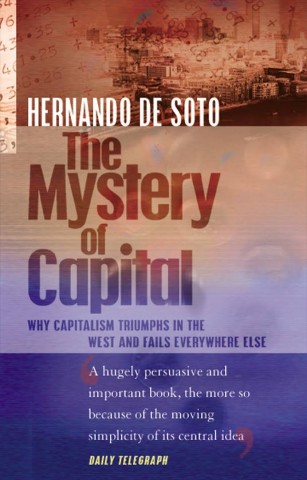The Mystery of Capital (2000) de Soto
Talking with undergraduate and graduate students has led me to believe that fewer people are investing their time in books. Wikipedia provides the long version, and Twitter keeps us up to date. One important thing that we have lost, in development studies and generally, is a more grounded understanding of where ideas came from and how they developed over time (beyond that Wiki link). In the practice of international development, I believe this is part of the reason we tend to see ideas be recycled (it appears we are not passing those lessons learned on very well). Hence, this series of "Thought Provoking" quotes from books. These posts may not encourage readers to pick up the books discussed, but I hope they broaden our vision of what knowledge is available to us.
This posts presents an essential read in development economics: The Mystery of Capital: Why Capitalism Triumphs in the West and Fails Everywhere Else (2000) by Hernando de Soto:
Setting the stage:
- "Capitalism stands alone as the only feasible way to rationally organize a modern economy. At this moment in history, no responsible nation has a choice. As a result, with varying degrees of enthusiasm, Third World and former communist nations have balanced their budgets, cut subsidies, welcomed foreign investment, and dropped their tariff barriers. Their efforts have been repaid with bitter disappointment. From Russia to Venezuela, the past half-decade has been a time of economic suffering, tumbling incomes, anxiety, and resentment; of "starving, rioting, and looting," in the stinging words of Malaysian prime minister Mahathir Mohamad." (1-2)
The problem:
- "…if people in countries making the transition to capitalism are not pitiful beggars, are not helplessly trapped in obsolete ways, and are not the uncritical pioneers of dysfunctional cultures, what is it that prevents capitalism from delivering to them the same wealth it has delivered to the West? Why does capitalism thrive only in the West, as if enclosed in a bell jar? In this book I intend to demonstrate that the major stumbling block that keeps the rest of the world from benefiting from capitalism is its inability to produce capital." (4-5)
The solution:
- "In the West, for example, most formal property can be easily used as collateral for a loan; as equity exchanged for investment; as an address for collecting debts, rates and taxes; as a locus point for the identification of individuals for commercial, judicial, or civic purposes; and as a liable terminal for receiving public utility services, such as energy, water, sewage, telephone or cable services. While houses in advanced nations are acting as shelters and workplaces, their representations are leading a parallel life, carrying out a variety of additional functions to secure the interests of other parties. Legal property thus gave the West the tools to produce surplus value over and above its physical assets." (51)
- "Many of these dwellings are not worth much by Western standards… But there are a great many such dwellings, and collectively their value dramatically outweighs the total wealth of the rich." (33)
- "The lack of legal property thus explains why citizens in developing and former communist nations cannot make profitable contracts with strangers, cannot get credit, insurance, or utility services: They have no property to lose. Because they have no property to lose, they are taken seriously as contracting parties only by their immediate family and neighbors. People with nothing to lose are trapped in the grubby basement of the precapitalist world." (56)
- "Government programs to give property to the poor have failed over the past 150 years whether they followed the bias of the right (private property rights through mandatory law) or of the left (protecting poor people's land in government-run collectives). The crippling political agendas of "left versus right" are largely irrelevant to the needs of most people in developing countries. These people move out of the law not because the law has privatized or collectivized them but simply because it does not address what they want." (169)
Ideas worth discussing:
- "Everyone will benefit from globalizing capitalism within a country, but the most obvious and largest beneficiary will be the poor." (190)
- "… in a developed country, the farmer's son who wishes to follow in his father's footsteps can keep the farm by buying out his more commercially minded siblings. Farmers in many developing countries have no such option and must continue to subdivide their farms for each generation until the parcels are too small to farm profitably, leaving the descendants with two alternatives: starving or stealing." (57)

